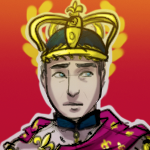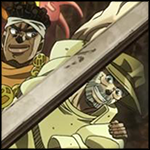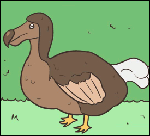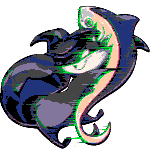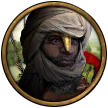|
No, give us more puns
|
|
|
|

|
| # ? Apr 28, 2024 15:47 |
|
If you aren't using puns for names, then thread titles are the least you can do.
|
|
|
|
Considering that hedge mazes were first constructed in the mid-16th century, this ruler is a true visionary.
|
|
|
|
No such thing as a bad pun. Since I'm really bad with geography, can you show a few wider-angle shots of maps and territory in the updates? Everything East of Germany is a complete mystery to me.
|
|
|
|
Orcs and Ostriches posted:No such thing as a bad pun. I'll try to, but I've already played a up until about 860 (then something happens that resulted in me having to stop playing). I believe I do start doing more maps of territories and such later on, though!
|
|
|
|
Chapter 9: Friction The start of 816 sees Rodislav II a much changed man. Whereas before he was outgoing and happy to indulge in his hobbies, now he's plagued by paranoia and worry over the veche of Novgorod and he sees their agents in everything. He begins to spend much of his time in taverns, drinking himself into a stupor. On one of these outings, he happens to meet a distant cousin who is was a mutual acquaintance of a recently passed friend. The two strike up a conversation, mostly reminiscing about their dear departed friend, when the conversation turns to politics. As it would turn out, Pribislava is a strong supporter of the veche; upon hearing this, Rodislav II quickly leaves.   Pribislava isn't the only vehement supporter of the veche, as it turns out; the veche has had its agents proclaiming the zeal and piety of Rodislav II far and wide, resulting in many of them arriving in Novgorod, hungry for war. The veche (and by extension, Rodislav II) is only too happy to oblige and war is declared against the Mordvins of Rostov with the intent of taking Uglich.   The veche sends a loyal commander by the name of Dobrynia to "advise" Rodislav II in how to best manage the war against Rostov. In reality, Dobrynia is the real commander of the Ilmenian forces, with Rodislav II acting more as a figure head to rally the troops behind. Dobrynia has Rodislav II gather all his forces in Novgorod and then instructs him to wait; war was declared in November of 816 and by the time the Ilmenian force is gathered its already winter. Waiting out winter before marching against the Mordvins also has an unexpected benefit: the Mordvins lay siege to Torzhok in December and suffer a shocking amount of deaths as winter sets in and punishes them for their inability to wait. Its hardly surprising then that when the Ilmenians finally do go on the offensive in March the Mordvins at Torzhok break so easily.  Uglich itself falls in June of 817 and, after an ill advised attempt at taking Torzhok fails, the Mordvins accept peace with Ilmen. The veche has scored a great victory once again, though this time Rodislav II receives a good chunk of the glory too.    The worries Rodislav II had about the veche have largely evaporated, as they still seem to care about bettering the realm and not just enriching themselves. Perhaps, he thinks, being the veche's puppet won't be such a bad thing.  Still, Rodislav II has other things to worry about, namely the diagnosis of cancer he received years ago. While it hasn't killed him yet, that doesn't mean he should take it any less seriously; to that end, he prays to the gods for good health and, to show how serious he is, offers his poetry teacher as sacrifice for his continued good health.   At the start of 818 Dobrynia, the veche's chosen commander for the war for Uglich, dies. Despite his great victories over the Mordvins, Dobrynia was both young and unmarried. As a distant cousin of Rodislav II's, Dobrynia's lands fall to him. Dobrynia's land isn't Rodislav II's for long though, as the veche recommends a replacement from Rodislav II's distant relatives.   Dobrynia's estate also included a not so small amount of gold, which Rodislav II uses to continue the tradition of patronizing the Greek weaponsmiths of Novgorod.  The veche has continued to use Rodislav II's reputation to gather warriors for their wars and soon many men have once again gathered in Novgorod, looking for war. Once again, Rodislav II is forced to do as the veche wants and war is declared on the Mordvins of Merya for the city of Yaroslavl.   While the men of Ilmen rush to Novgorod, Rodislav II concentrates on his health; he'll be away from Novgorod and the various Greek physicians he consults about his condition, so he has his court physician prepare several potions for him to take with him.   In mid September, the Ilmenian army finally reaches Yaroslavl and sets up for a siege, when news arrives: the Estonians are, once again, in revolt. Faced with two threats, the veche puts out a call for devout and loyal men to help fight the Estonians. Soon, a small force comprised mostly of Estonian Greeks and Ilmenians arrives in Novgorod, intent on protecting their homes.   The Mordvins attempt to drive off the Ilmenian army sieging Yaroslavl as the new year dawns, but have no success, breaking before the might of Ilmenian arms and men. Not too long after, the city falls into Ilmenian control.   Meanwhile, in Estonia, Liivimaa falls to the rebels. It takes nearly a month before the Ilmenian army can respond; the resulting battle is a resounding success for the Ilmenians. With no army left, the rebels quickly fall apart and their leader is captured and brought back to Novgorod in chains.    The Mordvins attempt to take Belo Ozero in April 819, but are forced to flee the field when the much larger Ilmenian force shows up. The Mordvins continue to raid Ilmenian lands, but most of the fight has left them and, in October, they finally admit defeat.   Rodislav II returns to Novgorod immediately gets back to being the veche's lapdog. While he still attends veche meetings discussing running the realm, he hardly has any power beyond offering small suggestions. The whole thing greatly dulls Rodislav II's original zeal for running the chiefdom.  He's so bored that when one of the veche members jokingly brings up rumors of a relic of some power, Rodislav II insists that a search be made for it. He's so vocal about it that, after some prodding, the veche agrees and sets one of their number upon the task of searching it out and keeping the chief informed of his progress. While the chief is distracted with stories of ancient artifacts, the veche quietly improves Novgorod's barracks in Rodislav II's name.   Two years pass quietly, with the veche largely running the realm while Rodislav II attends to his hobbies. This peace is broken when, in December of 822, Rodislav II's half-sister Vseslava approaches him to ask to be his chancellor. Under normal circumstances, Rodislav II would never think of appointing a woman as his chancellor, but in Vseslava he sees a chance to disrupt the veche; by appointing his sister as chancellor of Ilmen, she will have a place in the Novgorodian veche, making it the laughing stock of the chiefdom.  The same month also brings bad news in Rodislav II's search for the rumored artifact: apparently the veche's agent has been killed while searching. Rodislav II is sure that some nefarious force is trying to prevent him from acquiring the relic for himself. Vseslava immediately volunteers to act as Rodislav II's new agent in the search for the relic, an offer that he happily takes her up on.   In 823, Rodislav II is invited to Estonia by his cousin Sviatoslav for a small feast for family. While in his cousin's court, he can't help but notice a high number of Greeks, particularly Greek priests. Sviatoslav brushes off Rodislav II's concerns and the two end up enjoying each other's company; both promise to arrange another family feast sometime in the future.   Rodislav II returns to Novgorod in high spirits but soon starts feeling ill. Concerned that his cancer may finally kill him if left untreated, he approaches his personal physician seeing a more permanent cure than the potions he's been drinking. Vladimir is only too happy to oblige his chief and he removes Rodislav II's eye. Vladimir assures Rodislav II that if he can survive the process and the injuries that come with it, he'll finally be rid of his cancer.   Rodislav II fully intends to rest and heal after his operation, but the veche apparently has very different plans. They have gathered an army in Novgorod and have declared war on a tribe of Lithuanians to take the town of Zemgale. They have also mandated that the still recovering Rodislav II lead the armies personally.  
|
|
|
|
Rodislav is going to go through every cure before he dies, isn't he?
|
|
|
|
Ofaloaf posted:Rodislav is going to go through every cure before he dies, isn't he? Hey removing the eye did cure him! He's completely fine! Nothing can kill him!
|
|
|
|
Ofaloaf posted:Rodislav is going to go through every cure before he dies, isn't he?
|
|
|
|
Brutus Salad posted:At least he still has his dick! That's only a cure in al-Andalus.
|
|
|
|
You never posting the extent of your realm, even after successful wars is a really strange stylistic choice Also being Slavic and not taking advantage of the Cold Ones is sad. It's so easy to become almost instantly the High Priest or whatever, and then you can commit so many shenanigans. Them being the only society for non-Zun pagans is meh tho
|
|
|
|
Deceitful Penguin posted:You never posting the extent of your realm, even after successful wars is a really strange stylistic choice Gonna point you to a few posts up, where I explain this and apologize. Like I said, I'll try to do better in the future. Also, I'm not really trying to game CK2 to become the most powerful realm ever; I've done it and its boring. Its also, as you yourself pointed out, extremely easy to do. I don't super see the fun in just running roughshod over the game and I certainly don't see how that would make for a fun LP beyond a few short updates.
|
|
|
|
Chapter 10: Rodislav Victorious A still recovering Rodislav II gathers the Ilmenian forces in Novgorod, preparing to care out the veche's orders and take Zemgale from the Lithuanians. Unfortunately, Rodislav II's poor health following the removal of his eye means that the Ilmenians don't actually leave until April of 824, when his injuries are finally healed. Besides bringing his courage into question, but Latgale and Liivimaa before the Ilmenian army can properly respond.    Still somewhat nervous about engaging the Lithuanians, Rodislav II instead liberates Latgale, hoping to gather some reinforcements from the city. Instead, all he manages to do is anger the Lithuanians and cause them to march back towards Latgale with the intent of routing the Ilmenians and retaking the city for themselves. Surprisingly, Rodislav II's "strategy" of baiting the Lithuanians into a battle pays off, with a major victory for the Ilmenians.   With the Lithuanian army routed, Liivimaa is quickly brought back under Ilmenian control in early August and from there Rodislav II and his army march on Zemgale, which falls in September. The Ilmenian army continues their rapid march and Riga falls in November. As news of Rodislav II's victories reach Novgorod, the veche becomes anxious; they sent Rodislav II to war to teach him a lesson about crossing the veche, but instead all they've done is bolster the high chief's reputation as a fierce warrior.    News reaches Rodislav II that Latgale has fallen once again to the Lithuanians; Rodislav II, now overconfident about his ability to wage war, orders his army to head back to Latgale to once again defeat the Lithuanians. Eager to taste victory once again, the Ilmenians quickly march to Latgale.  Unfortunately, despite their numerical superiority, the Ilmenian army get caught trying to cross a river by the Lithuanian army and quickly get beaten to a bloody pulp. Rodislav II desperately attempts to keep his force together, but several of his chiefs decide to break off and retreat back towards their holdings. Their abandonment of Rodislav II leaves him with a significantly smaller force when he arrives in Liivimaa, followed by the Lithuanians who happily beat the snot out of the Ilmenians once again.   While he still technically has the control of Riga and Zemgale and has a larger force at his command, Rodislav II realizes that he has no actual way of winning the war against the Lithuanians; his forces are split in two by a much larger enemy force and, as far as he can tell, his chiefs have no interest in continuing the conflict. So, on March 2, 825, Rodislav II offers the Lithuanians a white peace. Equally tired of the war, the Lithuanians happily accept.  Rodislav II invites the Lithuanian chief, Arunas II, to a feast in Novgorod celebrating the peace between their people. Rodislav II makes sure the entire veche is in attendance and he gives a speech about the folly of war, making it extremely clear on whom he places the blame for the senseless war against the Lithuanians. After indulging in too much drink, Rodislav II retires to his quarters. Half way there, he slips and falls down a set of stairs. He's not entirely sure if he's injured himself, but he refuses to give the veche any more ammunition to use against him, so he picks himself up and hurries to bed. Thankfully there doesn't appear to be any lasting damage.  Rodislav II spends a few happy months in Novgorod, working on his garden with other followers of Jarilo, as well as overseeing the expansion of the city's market into a large trading hub, making Novgorod one of the richest cities in the north.   His peace is broken in May, when his brother Vysheslav declares himself the rightful ruler of Ilmen. A large portion of the veche, fed up with Rodislav II's recent attempts to remove himself from their control, side with Vysheslav, who is a infirm moron and easily controlled by outside forces.   Unfortunately, the veche greatly over estimated how much the chiefs supported Vysheslav's claim on Ilmen; its clear to them that this is a blatant power grab by the veche and that Vysheslav would be a terrible high chief. Only the chiefs of Luki and Tartu join in the rebellion. With no support, Vysheslav and the veche have no army to actually rely on. Meanwhile, soldiers from the Lithuanian war flock to Rodislav II, confident in his ability to command them, now that the veche is no longer meddling in his affairs. Rodislav II personally leads the Ilmenians at the Battles of Luki and Pskov, where he brutally beats the numerically inferior rebel force.   Rodislav II doesn't waste time and heads directly to Ingriya, Vysheslav's capital. The city quickly falls to Rodislav II's forces, with several minor nobles undermining the city's defenses. While Vysheslav manages to escape, many of the veche traitors are not so lucky. Rodislav II sends them back to Novgorod, stripped of their titles and ranks.  With Ingriya in loyalist hands, the rebellion quickly starts to crumble. By late January of 826, all the rebel leaders are captured and the veche's ill conceived rebellion. Vysheslav is stripped of his titles and land, along with his fellow compatriots. Tartu and Luki remain under Rodislav II's control, but Ingriya is given to his son Fedot.   Rodislav II also fills the vacant veche seats with people more to his liking, completely gutting the veche's growing power. He then uses his pet veche to back his plan to mint new, debased coins to celebrate his victory over the Vysheslav and his band of rebels. He then immediately invests the profits from his scheme into improving Novgorod's castle and warcamp.    The rest of 826, 827, and 828 are exceptionally quiet and peaceful, now that Rodislav II has achieved his final victory of the long hated veche. The peace is only broken when, to celebrate the new year, Rodislav II sacrifices one of the rebel chiefs to the gods to ensure the chiefdom's prosperity for another few years.  Novgorod also witnesses several leaps in technology, Rodislav II's steward, along with several Greek masons, begin to plan to further expand Novgorod's castle, as well as its roads and bridges. Rodislav II happily backs these projects, overjoyed to see his city prospering.    In May of 829, Ilmen once again prepares for war, this time against the tiny Mordvin chiefdom of Merya, for the city of the same name. His pet veche happily backs him.  Unfortunately, the chief of Merya is able to call many zealous Suomenusko warriors to his banner, much more than Ilmen could ever hope to field. Yaroslavl and Uglich fall within months of each other, and Rodislav II knows that there's absolutely no way Ilmen, despite being larger and wealthier than Merya, can ever hope to beat them. He quickly surrenders. This is an example of the horribly broken decisions tribals get allowing them to magically summon 2000 warriors for the cost of either 500 prestige or 200 piety. My best guess is that the chief of Merya spent all his prestige and piety to get nearly 10k troops. Since I've spent most of my prestige to build up Novgorod, there's nothing I can do to counter it. CK2, everybody!     Stunned and humiliated by the surprising ferocity of the Meryan bear, Rodislav II's self-esteem sinks to an all time low when, his coffers empty from his terrible war with Merya, he has to ask his younger nephew for a loan of 50 gold.   Feeling completely useless, Rodislav II turns his focus and energy towards further consolidating his power. Using his absolute control over the veche, he manages to push through a resolution reorganizing Ilmen to be more centered on the high chief and less on the various veches and chiefs outside of Novgorod proper.   Rodislav II falls ill once again in September of 830 and Vladimir, his court physician and heir, tells him he has measles. Vladimir insists on using Greek medicine to balance Rodislav II's humors; to this end he induces vomiting. Not only does this not cure Rodislav II, it makes him feel worse.    Rodislav II continues to not get better; in fact his condition worsens. It becomes abundantly clear to everyone except Vladimir that Rodislav II is suffering from dysentery, who still insists that Rodislav II just has an extremely bad case of the measles. Rodislav II would argue, but thanks to Vladimir's previous treatment, he's too busy using his mouth to vomit.  Confounded by this strange case of measles, Vladimir returns to an old standby: mercury, which helped Rodislav II treat his cancer many years ago. Much to Vladimir's surprise, this goes... poorly.  Rodislav II lives to see the new year, but not much else. He passes away on January 2, 831 and Vladimir is made the new high chief.  History remember Rodislav II as High Chief Rodislav II Dobro, often translated as Rodislav II the Good.
|
|
|
|
I've never seen that death message before, is that a reference to the CK2 pre-release trailers? This one? Edit: Sounds like Vladimir should have spent less time on The Legends and more on medicine.
|
|
|
|
catlord posted:Edit: Sounds like Vladimir should have spent less time on The Legends and more on medicine. Or maybe he knew just enough?
|
|
|
|
Seriously, dude was just probably tired of waiting to inherit.
|
|
|
|
Chapter 11: The Bad Years Vladimir is made high chief of Ilmen amid a cloud of controversy; many say that he intentionally killed Rodislav II. This claim is supported by the fact that Vladimir is one of the smartest people in Ilmen. For his part Vladimir denies this and points to his past actions as a lowly chief: he's always been a zealous follower of the Slavic faith, diligent, and just in all his dealings. Still, the rumors of his ill deeds swirl around, causing the new high chief no small amount of stress.  Eager to prove that he's a capable and just ruler, Vladimir goes to the veche and asks them for their support for a small war against the heathen Finns in Zaozerye; the veche is still very much full of Rodislav II's lackies, so they happily agree, eager to show their worth to the new high chief.   The Ilmenian army, six thousand men strong, marches to Belo Ozero to defeat the Finns besieging the town. Its a crisp May morning when battle is joined. In the heat of his first real battle as high chief, Vladimir rushes ahead of his force and is promptly captured. Not soon after, the disorganized and leaderless Ilmenian army retreats. The war ends in June 831, when Vladimir is forced into peace by his captors in exchange for his release. Vladimir returns to Novgorod extremely humiliated.    Vladimir returns to what he knows: studying nature and honoring the Slavic gods. After his humiliating defeat, he asks Perun to favor him and his people in all future battles; to show his dedication, he lops off a hand, having previously sacrificed an eye to the gods. Whole he recovers from his self inflicted injuries, he also has begins reading Greek books about the movement of the stars. Inspired, he decides to duplicate the Greeks' experiments and methods for his own work.   In fact, Vladimir spends most of his free time studying the stars and he becomes obsessed with replicating the Greeks; he starts requesting specialty items from Novgorod's merchants that frequently trade with the Byzantines. With the high chief's backing, trade greatly expands, bringing with them new ideas and people eager to see Novgorod. One of these people is the wife of a Finnish high chief, who, after seeing the grandness of Novgorod, wishes to form some sort of alliance. Vladimir will hear none of it and tells the horrible heathen woman to go back to her icy hellhole of a home.   Despite his previous defeat against the Finns, word of his sacrifice to Perun brings zealous warriors flocking to Novgorod, where Vladimir happily finds accommodations for them in the city. Vladimir's injuries from his sacrifice also finally heal, showing once more that he is favored by the gods.   Vladimir's humiliation reaches a new high when, in 832, he approaches one of his chiefs to help relieve some of the chiefdom's debt. He points out the precedent set by Rodislav II and those before him, and then goes into a long fable about the gods and the universe's hierarchy. Chief Sviatoslav flatly refuses to pay off Vladimir's debts, leaving the high chief speechless.   Grumbling about fools and idiots who will see the realm destroyed by their stupidity, Vladimir returns to his studies of the stars, the only thing that doesn't actively try to humiliate him. He holes himself up in his study, turning away anyone that dares disturb him; his door only opens when he's paying for strange new equipment imported from the Greeks. Of course, with the chiefdom already in debt, Vladimir's wanton spending isn't exactly helpful.   Vladimir is finally forced to leave his study by his veche, which has increasingly taken a more central role in governing the chiefdom. They've arranged a small feast with some of the realm's richer nobles in the hopes of convincing them to relieve some of Ilmen's debt and Vladimir is required to make an appearance and give a small speech. Vladimir instead shows up long after the drinking and feasting has been done, gives a stinging speech about the debts the chiefs owe to him, and then stomps out of the room. To no one's surprise, the assembled chiefs do not agree to the veche's plan to pay off some of the crown's debt.   Vladimir is getting close to understanding the the cosmos, just in time for a revolt against his rulership. Thankfully, the veche has not been ignoring the realm, and they've managed to gather a small force to help fight the rebels. They once again rouse Vladimir from his study of the skies and force him to actually do something vaguely related to running the realm.    Reluctantly, Vladimir leads the Ilmenian army against the rebels and his commanders deal a resounding defeat to them at the Battle of Pskov. Where is Vladimir during this battle? He's busy working on finishing his study of the skies. Still, even without his help, the rebels are completely defeated and peace once again reigns in Ilmen.    Vladimir returns home a victor, but instead of celebrating his victory and rewarding the veche and their commanders, he instead continues his obsessive study of the stars. His peace is only disturbed in November 834 when the veche asks for his opinion on a matter. Vladimir is only half listening to them, and he slowly grows more and more annoyed with their prattle about improving the realm and such. In a fit of rage, he tells them that he is all in favor of whatever initiative they're discussing, before storming off to finish his "more important" work. He later learns he apparently voted in favor of a war with Merya, with him leading the Ilmenians.   This time though, the Meryans have a significantly smaller force and the Ilmenians are more than ready to take them on. Of course, Vladimir insists on bringing most of his stargazing equipment with him; as a result Uglich falls into enemy hands before the Ilmenians can even respond.  Finally, in March 835, the Ilmenians are finally ready to move out; word is that the order finally came from Vladimir in the dead of night. Strangely, most of his valuable equipment is missing and he refuses to even discuss his studies. Rumor is that his experiments greatly differed from his beloved Greeks and that he's too embarrassed about his failure to ever talk about it. Once again, Vladimir is humiliated.  The Ilmenians meet the Meryans at Yaroslavl and Vladimir, for the first time, focuses his considerable intelligence on fighting the perfect battle. Instead, he's nearly run through by a sword and he flees in terror; seeing their high chief running, the Ilmenian force follows suit. Shortly after, Yaroslavl falls into the hands of the Meryans. 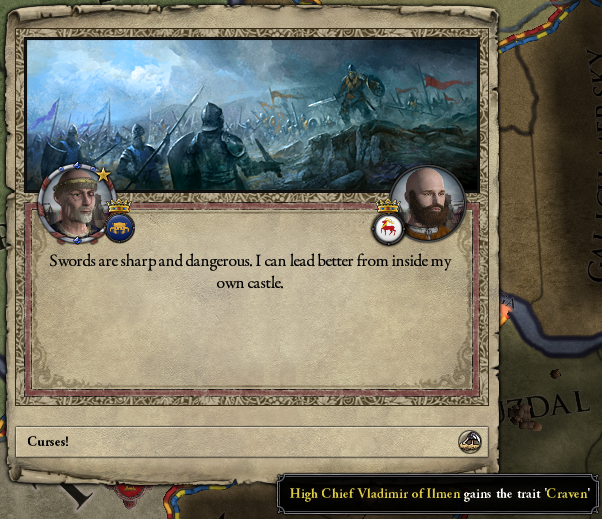   Humiliated one the field of battle yet again, Vladimir unconditionally surrenders to the Meryans. The high chiefdom is once again in deep debt thanks to a failed war.  Vladimir quietly returns to his life of studying alone, leaving the veche to once again run things, but they're unfortunately still the fools and idiots Rodislav II put into power. They throw the chiefdom into even more debt when they buy new ships for the Albani trade route, which hasn't exactly been the most profitable venture.  In 837, Vladimir is once again forced to make an appearance at a feast to ask his chiefs for help relieving the chiefdom's debt. Once again, Vladimir totally ruins the event, showing up poorly dressed and groomed, before giving a short speech that amounts to "give me your money, you idiots." Once again, no one is willing to part with a few gold to help their terrible high chief.   837 also brings some rather strange and alarming news: the Estonian Greeks have managed to convince one of Vladimir's distant cousins to embrace their religion and accept Christ into his heart. Vladimir invites Sviatoslav to Novgorod and tries to persuade him to give up the Greek religion. Sviatoslav politely declines and instead begins to vigorously debate Vladimir. Vladimir tries to remain calm and collected (after all Sviatoslav is but a young idiot), but as the debate last longer and longer, Vladimir can no longer control himself and finally calls his kinsman a blathering idiot who is easily swayed by false gods. Sviatoslav and Vladimir part on less than ideal terms.   In 838, an overworked, humiliated, and exhausted Vladimir falls infirm, completing a life full of continued humiliation and hardships. The veche once again picks up the slack, but this time with Vladimir's heir Briachislav at the helm. Young Briachislav has a keen military mind and uses the veche to help raise funds for a massive regimental training ground in Novgorod. Vladimir sits by impotently screaming about the costs of such a venture, but no one pays him much mind. In fact, hardly anyone notices when Vladimir slips into a coma in late April of 839 and in early May of the same year, Vladimir dies. There's a short and poorly attended funeral, before Briachislav is declared new high chief.    Vladimir died as he lived: completely humiliated and unloved by his people.  History remembers Vladimir as High Chief Vladimir Okayannyy, often translated as Vladimir the Accursed.
|
|
|
|
Who needs this Christ fellow when you can just gouge an eye or sacrifice a court jester?
|
|
|
|
Vladimir did nothing wrong.
|
|
|
|
Freudian posted:Vladimir did nothing wrong. I strongly disagree.
|
|
|
|
THE LESBIATHAN posted:I strongly disagree.
|
|
|
|
Chapter 12: Vae Victis Briachislav is an ambitious man, known for his brawn, as well has his wrath. For the last two years, he's been working with the veche to build something for him to inherit, and the work has paid dividends in the form of cold, hard gold; he and the veche manage to pull Ilmen out of debt, with some extra to spare. Still Ilmen has not has a successful war in some years, and Briachislav aims to fix that as soon as possible. 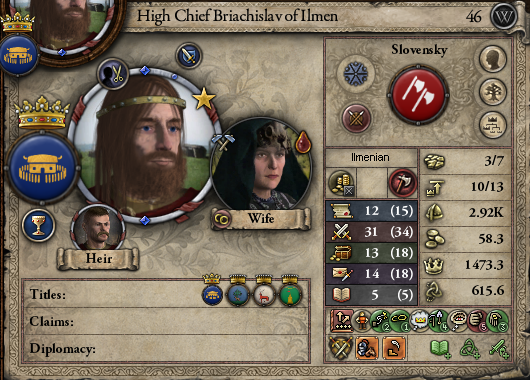  The first thing Briachislav does to kick off his reign is make it known that Perun will guide not only his sword, but the chiefdom; to show how serious he is, he offers up one of his eyes to the gods.  But Briachislav also knows that the majority of the ruling class favors Jarilo as their patron god and he has no wish to alienate the people who are going to manage the chiefdom while he's out winning wars, so he declares a month long festival celebrating Jarilo as the most important god in the Slavic pantheon. Its the first such festival to ever take place in Novgorod with official backing.  Of course, the Orthodox Ilmenians in Estonia refuse to attend a "heathen festival that denies the one true God and his son." Briachislav doesn't understand why anyone would refuse a free food and good company, but clearly the Greek gods are jealous and absolutely not interested in having a good time. 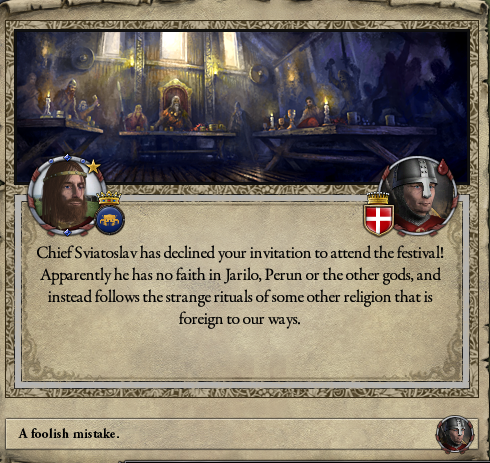 Still, the festivities go on and the people of Novgorod elect one of the assembled chiefs to represent Jarilo. After its all said and done, Briachislav's vassals leave Novgorod, confident in their new high chief's ability and, as an added bonus, no one can question Briachislav's piety to the Slavic faith.    Of course, not everyone is in love with their new ruler and Briachislav's quick to run down and stop any plots that would undermine his power; some would argue that this is borderline paranoia, but after the dark years under Vladimir, everyone is just happy to have a high chief that's on the ball and willing to actually do something about plots against him.   Besides bringing some much needed stability to Ilmen, Briachislav also brings some much needed legitimacy to the whole affair; while he was still just the heir apparent of the chiefdom, Briachislav had an iron crown and a ceremonial axe crafted as the regalia of the Ilmen throne, finally giving the high chief an air of much needed importance.  Towards the end of 839, Briachislav's wounds finally heal, leaving a nasty, but rather dashing, scar. All of this lends itself to his growing legend, and soon Novgorod experiences an influx of warriors, whom are quick to settle in and around the city.  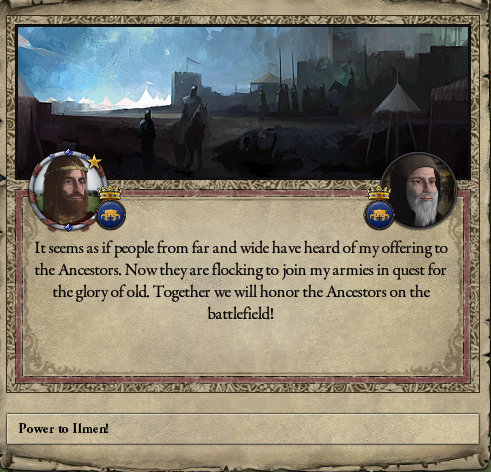 In 840, Briachislav calls for all true followers of Perun to assemble in Novgorod, to join in a glorious fight that will honor not only Perun, but also the ancestors of all Ilmenians. Nearly 1,000 men come to the capital, ready to avenge one of Ilmen's greatest set losses: Briachislav intends to break Merya and finally claim it for Ilmen. The veche, having worked with Briachislav for over a year during Vladimir's reign, is quite confident in his ability to wage war; those that aren't are easily bought, though.  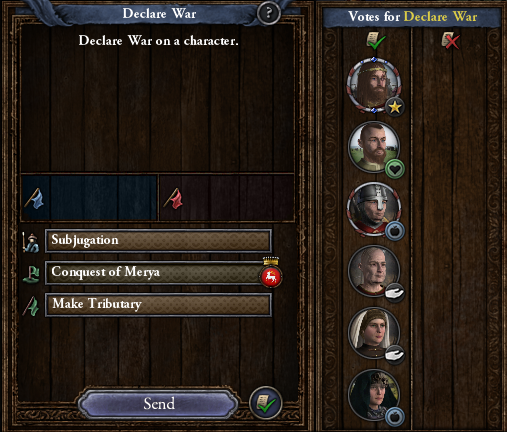 Yaroslavl falls to the Meryans, followed quickly by Uglich. High Chief Uchva, leader of the Meryans, starts sending peace offers, confident that this war will follow the last two; Briachislav sends the messenger's severed head back to Uchva as his reply.   Angered by what he sees as Ilmenian arrogance in the face of a superior fighting force, Uchva crosses the Volga into Torzhok to attack Briachislav's force, confident in getting an easy victory and ending the war. Briachislav provides him with no such victory, instead soundly defeating the Meryans, the first such victory in 20 years. 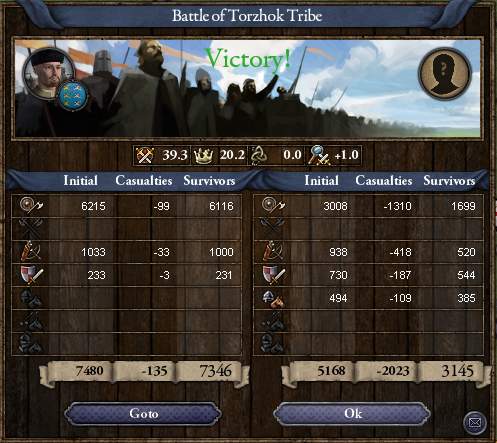 Briachislav follows up his victory at Torzhok with the liberation of Uglich and Yaroslavl, before crossing into Merya itself and once again defeating the Meryans on the battlefield. 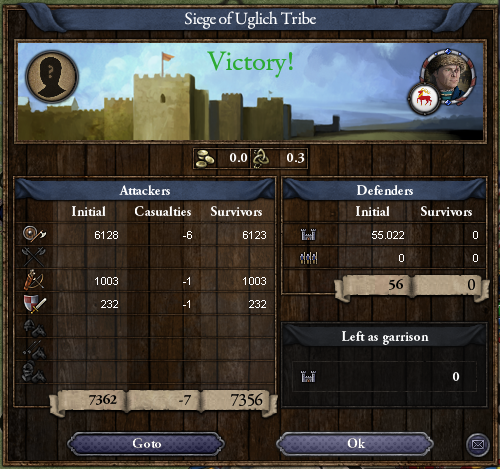   Uchva has not choice but to surrender and in 841 Merya is made part of Ilmen; as a final insult to his defeated enemies, Briachislav renames Merya to Rostov, intent on destroying any remnant of the tribe that humiliated Ilmen for the reign of two high chiefs. 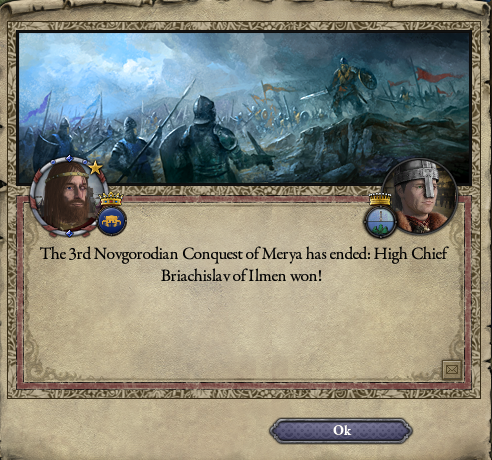  841 brings some startling news to Novgorod, as more and more Greeks start to seek passage on Ilmenian; apparently, there's no longer just one emperor, but four, all fighting for the throne in Constantinople, with the "rightful" emperor being forced to relocate to the city of Chersonesus. Briachislav, like his predecessors, directs them to settle in Estonia, which, besides displacing the rebellious Estonians, also has the added benefit of letting them be ruled by the Orthodox chief Sviatoslav.  Not too long after having the Greeks settle in Estonia, Sviatoslav hears that within their number is a great inventor and engineer. Perhaps hoping that by making the Orthodox Greeks useful to the chiefdom will lead to the spread of his religion, Sviatoslav introduces Briachislav to this man, promising that with a little funding, he will make a machine of war that will cow all that stand in Ilmen's way. Always eager for new and exciting ways to wage war, Briachislav gives Sviatoslav and the Greek his patronage.  In June of the same year, the experiments pay off, as the Greek, whom is named Andronikos, creates some truly amazing exploding arrows. While they are expensive to make and prone to fizzling out during heavy rains, they're still excellent for scaring enemy troops. Thoroughly impressed by his work, Briachislav makes Andronikos part of his court as one of his advisers.  Towards the end of 841, Briachislav receives some strange news; apparently the realm of the Avars has fallen to a mix of Slavic tribes. The leader of these tribes is a man by the name of Andrija, whom has bound the various Pannonian Slavs together under his rule. Only time will tell if this confederation will last. 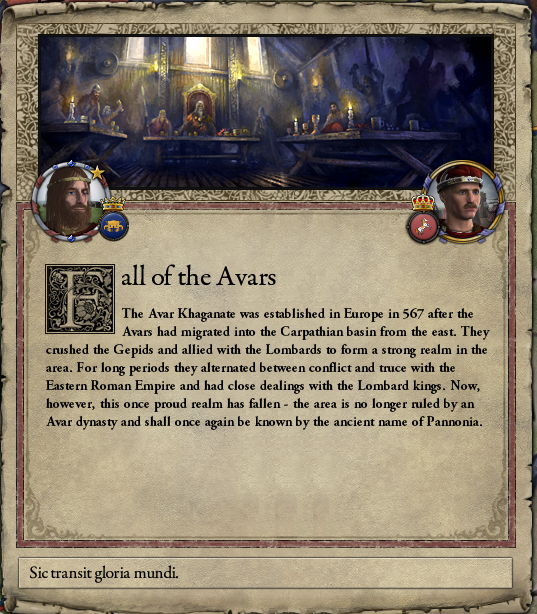 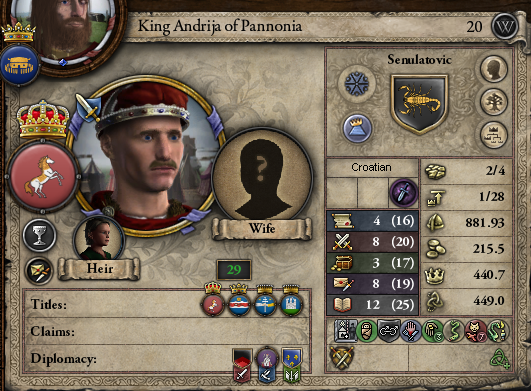 Briachislav has a grand vision for Ilmen, but to do it he needs more control over his chiefs. With a few strategic bribes to key members of the veche, as well as promises of more say in the running of the chiefdom, specifically more say in the judiciary. Briachislav is only too happy to grant them their requested powers, as it allows him to focus on the aggressive expansion of the chiefdom. 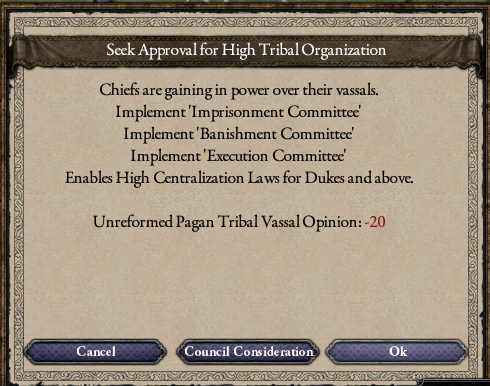  In July of 842, Briachislav finally starts to bring his grand vision into reality by declaring war on the Finns of Zaozerye, intent on claiming the city for himself.  It isn't until January of 843 that Briachislav makes his move; most of the Finns have returned home as winter set in and the force defending the city is mostly there for show, confident that no one would be insane enough to attack during the biting cold of January. Briachislav is insane enough, though, and he completely crushes the Finns. Zaozerye falls just a week later and soon the Finns are asking for peace. Zaozerye is now in Ilmenian hands.    Briachislav doesn't rest for long, and in June he gathers the veche again and asks them for their support in declaring war against the Lithuanians to the south of Ilmen for the city of Vilnius. They veche is only too happy to support Briachislav's adventures.   Of course, it wouldn't be a real war if the Estonians didn't use it to revolt against the Ilmenians. This time they're apparently mad about the influx of Greeks, who are slowly taking over Estonian farms, at the behest of Sviatoslav. 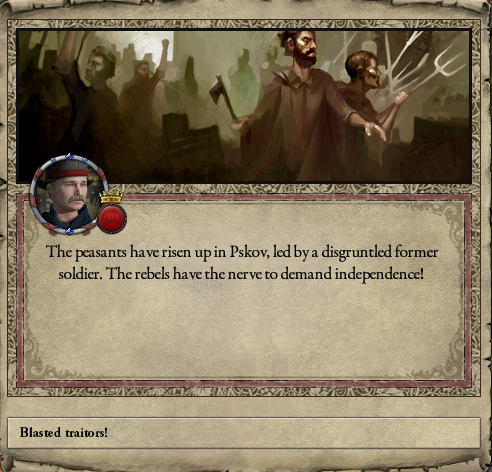 Briachislav quickly crushes the Estonians at Pskov and ends their foolish revolt before it can gain any sort of traction. He sends their leader, a man named Lible, back to Novgorod and asks the veche to deal with him as they see fit. They elect to execute him, much to no one's surprise. 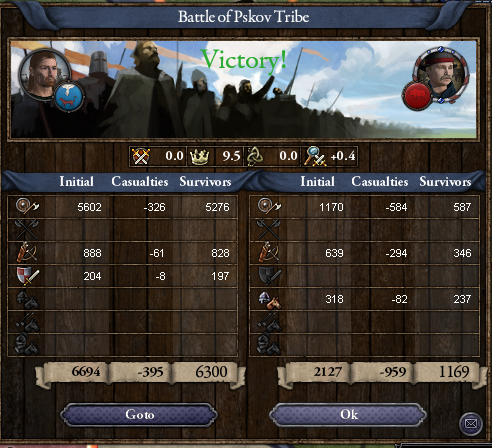 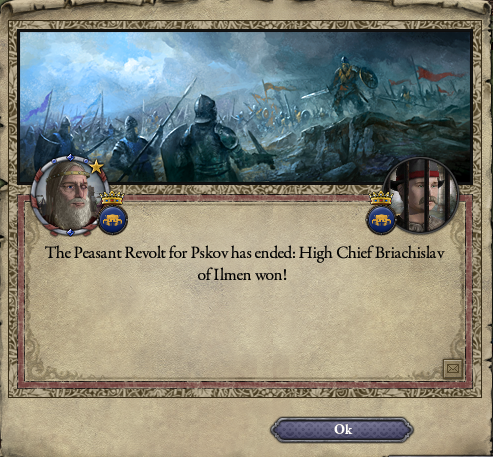  With the Estonian distraction out of the way, Briachislav turns his attention back to besting the Lithuanians. The Lithuanians have laid siege to Liivimaa and the Ilmenians engage them at the start of the new year, soundly defeating them. Briachislav drives his army hard to follow the Lithuanians as they retreat towards Vilnius; he refuses to give the enemy even a single day of rest. Thanks to this, the army the Ilmenians face at Vilnius is significantly smaller and more disorganized than what the one they fought at Liivimaa. About a month later, in March, Vilnius falls. 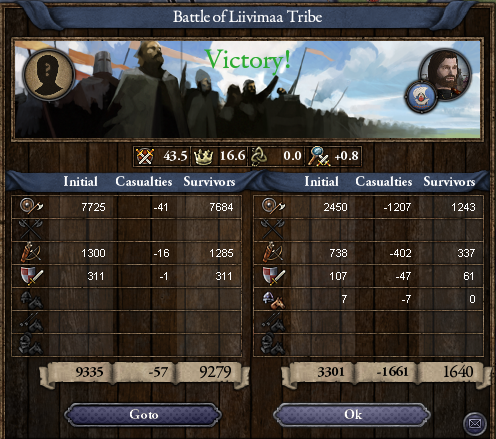 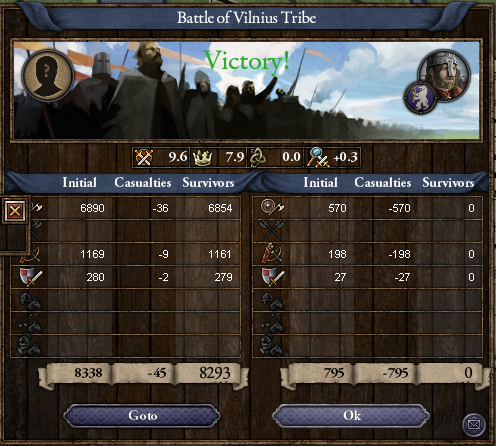 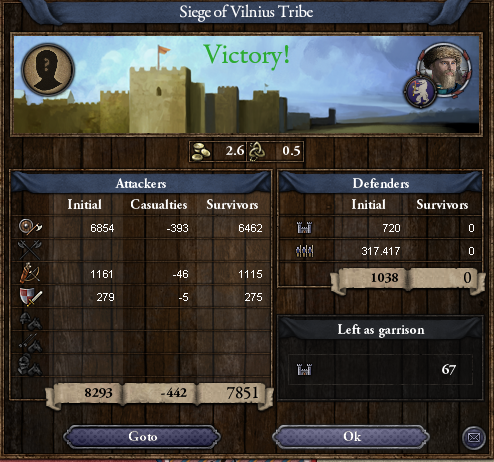 The Lithuanians manage to rally themselves at Riga, but Briachislav refuses to let them threaten him and his army. Briachislav once again proves himself to be a commander without peer, as he and his men easily kill four Lithuanians for every one Ilmenian that falls. After the Battle of Riga, the Lithuanians have no choice but to surrender.   Briachislav returns to Novgorod a hero of three wars, one right after the other. After the hard, dire years under Vladimir, Briachislav's ability and strength is refreshing, but it remains to be seen if he will be able to keep up this rapid pace of conquest.
|
|
|
|
Nice to see something good actually happening for once.
|
|
|
|
Chapter 13: Unreasoning Briachislav's constant wars have drained Ilmen's coffers, so before he can continue his conquest, he must allow the chiefdom to recover. So, instead he prepares himself for war, practicing daily to better his understanding of personal combat, as well as tactics. During this time, Briachislav also spends time with Andronikos, whom tells him tales of the conquests of the Romans; Briachislav vows that his conquests will rival those of the emperors of old.   He also tries his hand at hunting, though it pales in comparison to actual combat. Still, he does find some common ground with a distant nephew and soon the two are discussing the upcoming wars Briachislav has planned. 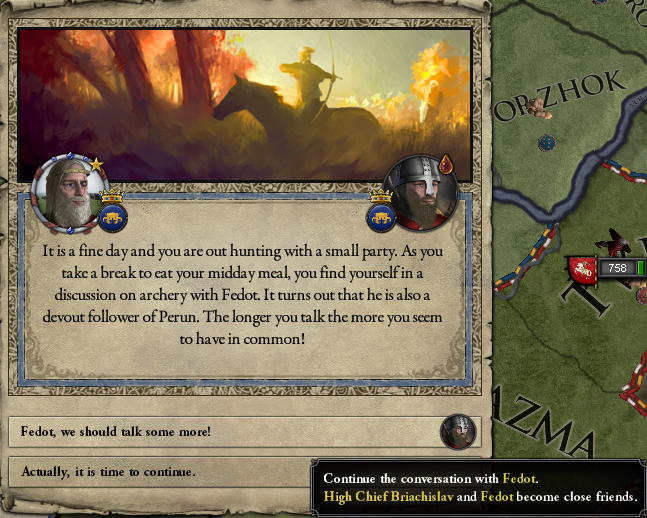 Meanwhile, the veche continues to administer the realm while Briachislav dreams of war and glory. Knowing their high chief's plans for the future, they allocate some funds to improve Novgorod's war camp. They also set aside some gold to keep a trade route out of the newly conquered Zaozerye going in an effort to win over the Finnish traders of the city.   The veche's actions have the unfortunate side effect of forcing Briachislav into postponing his dreams of conquest for another few years, but instead of becoming resentful of the veche, Briachislav instead moves to empower them to better collect taxes and carry out the day-to-day administration of Ilmen. Of course, the veche is only too happy to support him.  Briachislav's move to give more administrative power to the veche proves to be a wise decision, as the veche quickly begins to collect taxes in and around Novgorod; soon the chiefdom's coffers are once again swelling with gold. They invest part of this into once again improving Novgorod's war camp, but leave the rest for Briachislav.  He quickly puts it to good use and, in 848, declares war on the small Mordvin chiefdom of Mochkava, which controls a single, small city. Briachislav hopes to claim the city for Ilmen. By now Briachislav's legend is known far and wide and thousands of men flock to his banner. Despite the relative weakness of Mochkava, eleven thousand warriors have joined Briachislav, making it the largest band of warriors ever assembled by a high chief. Truly, Briachislav is uniquely blessed by Perun.  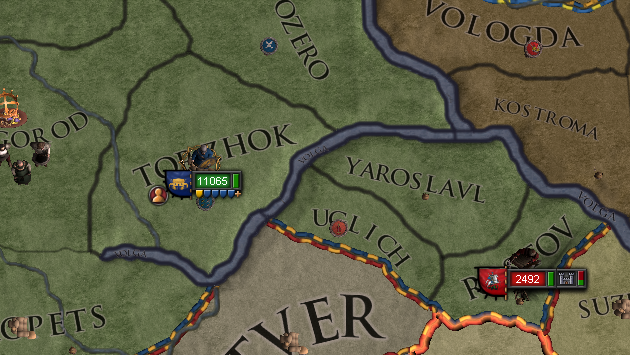 The word of the Ilmenian host is enough to chase the Mordvins out of Rostov, but Briachislav refuses to let them get off so easily; instead, he peruses them into foreign territory, much to the chagrin of the Mordvin chief who rules the area. Once they're pinned down, the Mordvins melt before the Ilmenians. Briachislav then swings back towards Mochkava and lays the city to siege. With his holdings lost, the Mordvin chief has no choice but to surrender to Briachislav. As with Rostov, Briachislav strikes the name of the Mordvin city and renames it Pereyaslavl Zalessky. 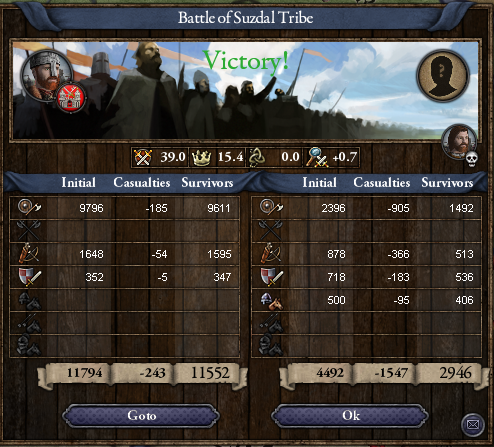   Briachislav's skills in war have spread as far as the steppes and one of the nomadic khans is soon asking for a betrothal between one of Briachislav's daughters and the youngest of the khan's sons. Briachislav can see the advantages of having a friendly horse lord on his side, so he agrees.  Briachislav isn't one to rest on his laurels (or rest at all, really) and it only takes a year before he's ready to go to war again. This time, his target is set squarely on Zemgale. The veche has no choice but to support Briachislav, as doing anything else would only turn the public against them. So, in 849, war is declared once again against the Lithuanians.  Zemgale quickly falls, with its defenders simply surrendering after they learn that Briachislav is the one leading the Ilmenians. The same is true when Briachislav's army arrives at Riga; its quickly becoming apparent that the legend surrounding Briachislav is almost as useful a tool as Briaschislav's ability to wage war.   The Ilmenians finally encounter a small Lithuanian army at Kurzeme, barely one hundred men strong. The survivors flee towards Riga, but Briachislav chases them down and, after an extremely one sided fight, not a single Lithuanian remains alive. Soon, word spreads about Briachislav's brutality and the Lithuanians begin calling him " Beprotikas," which roughly translates to unreasoning. Briachislav is only too happy to own the nickname and even starts having his men use it.  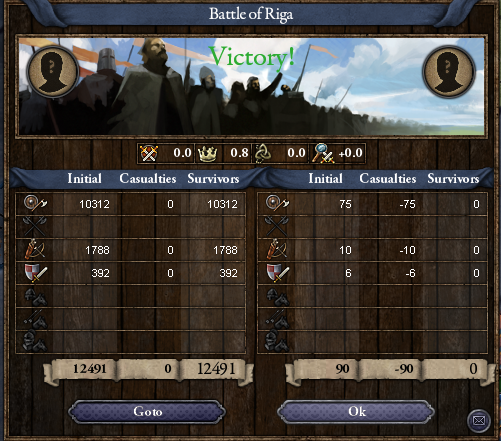 Briachislav is sure that the Lithuanians will accept peace after the the amount of damage he's done to their armies and cities, but they stubbornly refuse to deal with him. So, Briachislav continues to to wage unceasing war on them. The city of Trakai falls in February of 850 and Briachislav finally manages to engage a significant Lithunanian force Galindia. The Ilmenians, predictably, win and the Lithuanians retreat to Marienburg, where they link up with a few other tribal armies and prepare to make their last stand against the Ilmenians. It proves to be absolutely futile, as the Lithuanians lose half their number, while Briachislav only loses a handful.    Peace is finally made in June of 850, and Zemgale is made part of the growing Ilmenian chiefdom. But Briachislav isn't satisfied with just the city, he also forces the Lithuanians to hand him Riga, which they consider one of the holiest sites of their religion. Briachislav then orders his men to tear down any Romuva holy symbols in Riga's temple and replaces them with proper Slavic symbols; the message is clear: if you get in Briachislav's glorious vision, he will do everything in his power to destroy your false gods. 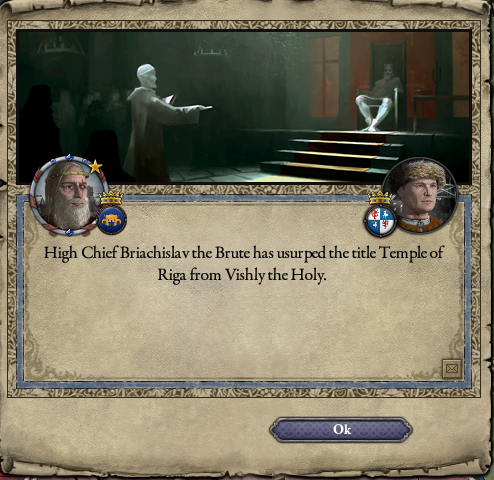 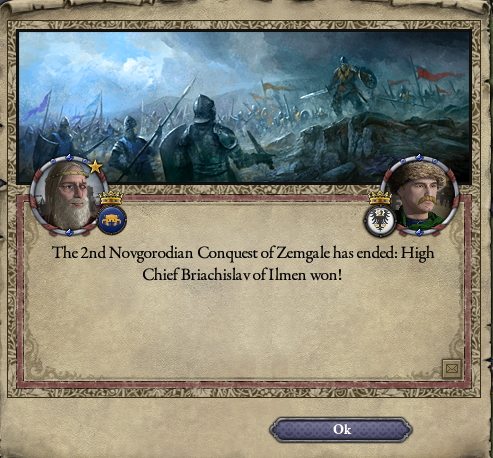 With his enemies cowed before him, Briachislav returns once again to Novgorod with a brand new reputation of ferocity in battle. It finally looks as though Ilmen is rising in the world, and its all thanks to Briachislav's guidance and strength.
|
|
|
|
State of the World: 850 The Ilmen of High Chief Briachislav is much different than the one of Rodislav I Durak; its significantly larger, but also much more prosperous, thanks to its trade with not only the Byzantine Empire, but also with the far off realm of Alban. Ilmen is quickly becoming a regional power, though its ability to continue expanding and prospering is greatly hindered by its tribal government and its only thanks to the tireless efforts of the various Ilmenian veches, led by the veche of Novgorod, that things have held together so well. 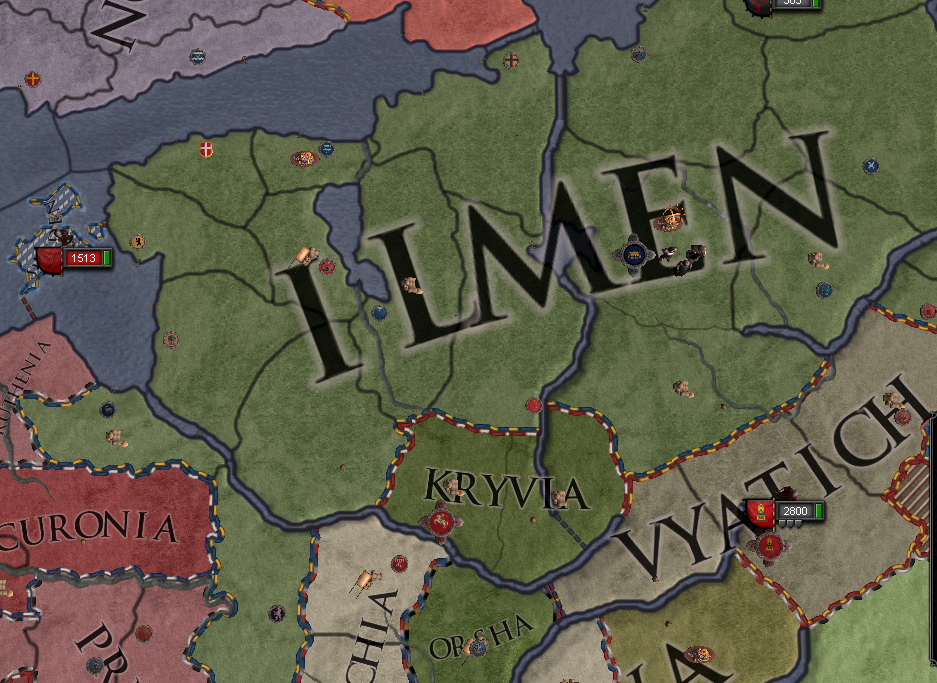 To the south, the Byzantine Empire has mostly recovered from its constant civil wars, though they still have the occasional rebel prince and the emperor hasn't moved his court back to Constantinople out of fear of the various noble plots to take his throne. The recent instability of the Byzantine throne has also allowed Muslim adventurers to seize some Byzantine land, in the form of the Subaid Emirate. How long the Greeks will tolerate the emirate still remains to be seen, but until then Ilmenian traders have used it to their advantage, bringing more and more Arabic goods to Novgorod. 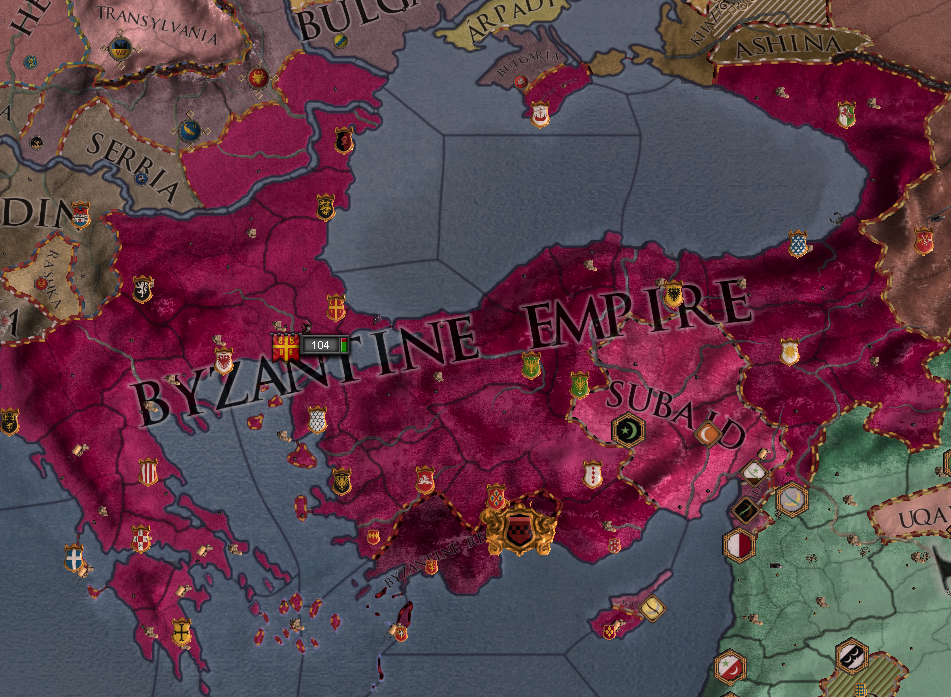 To the west, Francia holds claim to the throne of the Western Empire. The Frankish emperors have used their vast armies and wealth to slowly expand into Hispania, kicking out the Muslim emirates and sultans that have made residence there. Francia's strength has also driven the Norse away from their shores, making them focus on Alban; true to their self-proclaimed Roman roots, Francia has used this as a means to slowly expand their influence over the island, offering the Albani kings some protection against the viscous Norsemen.  Lomard Italy is deeply divided, as civil war tears the kingdom apart. The northern rebels are supported by Francia, who seek to install king more to their liking, with the goal of reclaiming it for the imperial throne. The southern loyalists are receiving support from the Greeks in Sicily, who have no interest in allowing the Franks any sort of influence in the affairs of Italy. Unfortunately, there's only so much the Greeks can do without the backing of their own emperor. 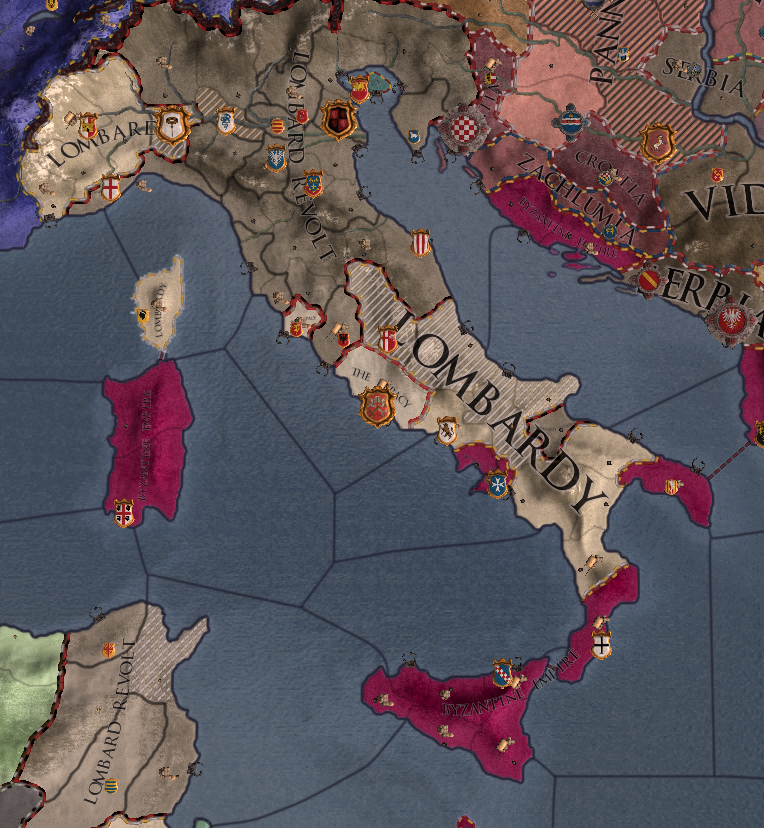 Central Europe is a mess of tribes, most of which are Slavic. Poland, Bohemia, and Pomerania hold the most power in the region and the three are constantly at odds, as they try to assert themselves over the others. The Pannonian tribes are still united, though the Avars are slowly rebuilding their power base in Transylvania and have start to support Avar adventurers that seek to reclaim Pannonia for their people.  Finally, the steppes continue to be dominated by Tengri nomads but the Ilmenians have a tenuous non-aggression pact with the Ashina, thanks to Briachislav's marriage into the ruling khan's dynasty. Should Ilmen continue to expand, it'll eventually bump into these fierce horse lords. 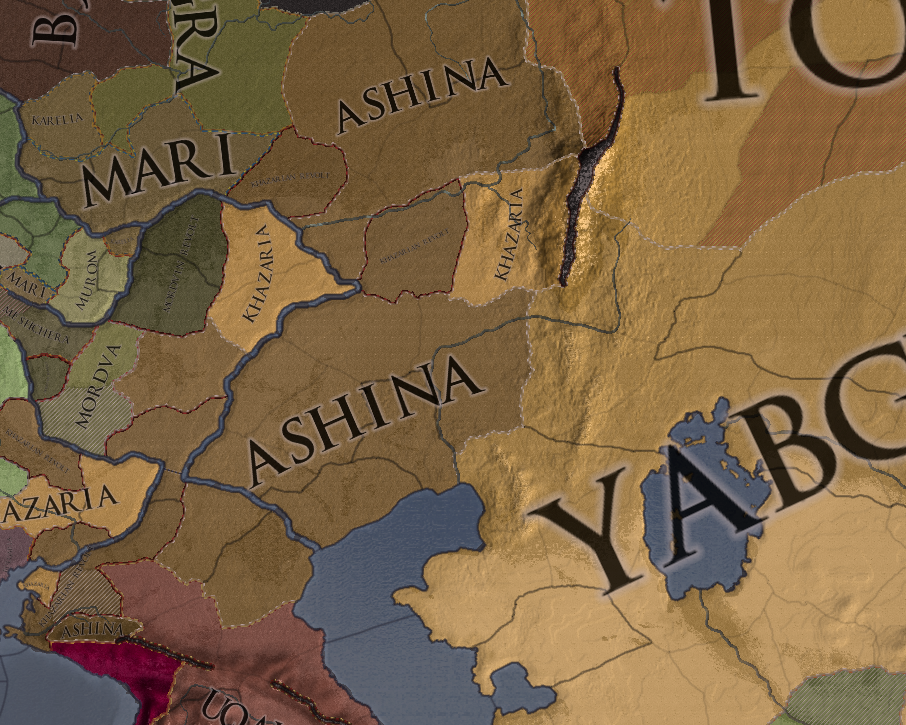 Religious Map (Slavic holy sites highlighted)  Political Map 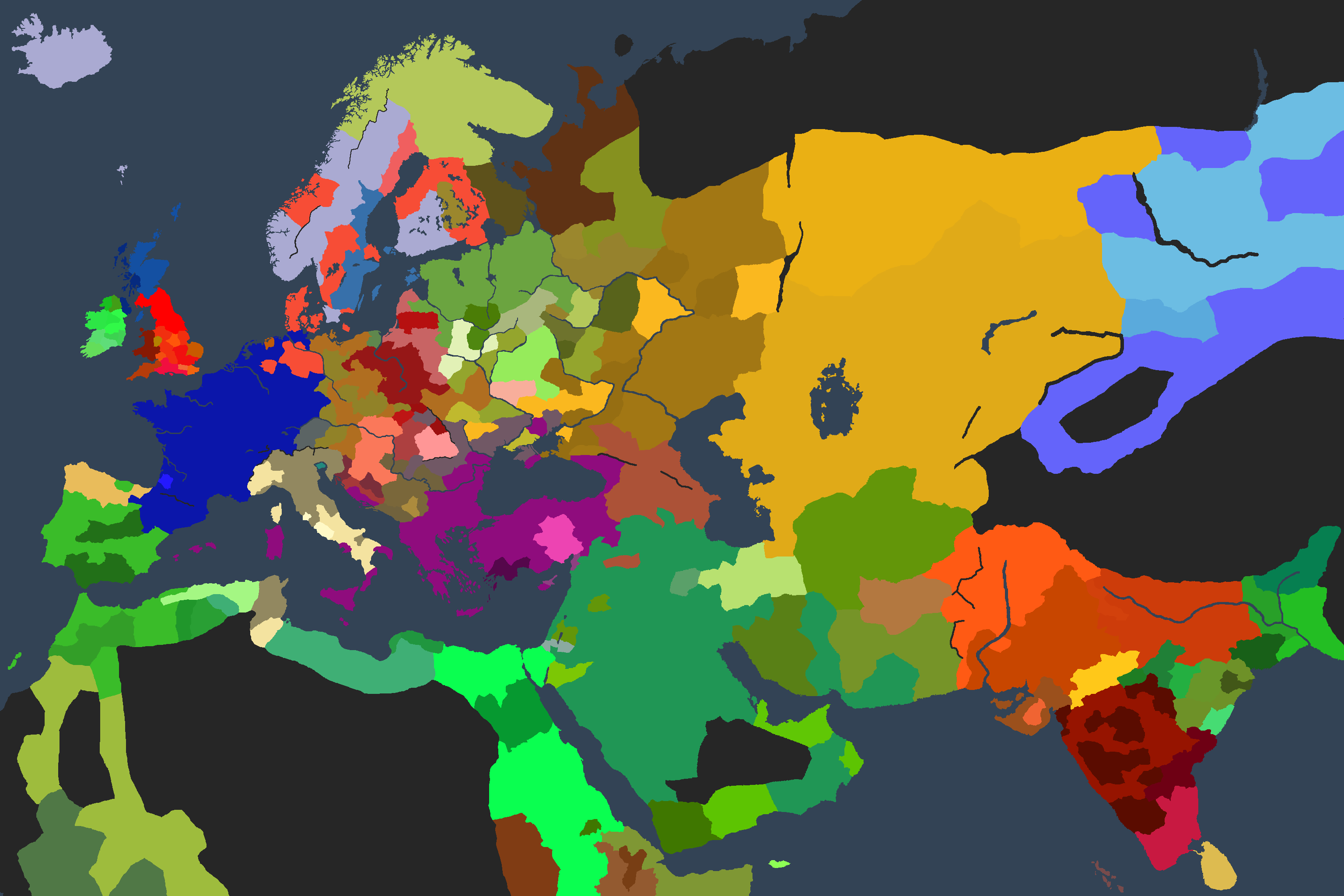
|
|
|
|
That Poland/Bohemia bordergore 
|
|
|
|
Urgh, renewing the slavic faith is going to be hard. I believe in you, but "Urgggh"
|
|
|
|
Josef bugman posted:Urgh, renewing the slavic faith is going to be hard. I believe in you, but "Urgggh"
|
|
|
|
Chapter 14: Legend Ilmen is again in debt, thanks to Briachislav's wars, much to the consternation of the veche; Briachislav attempts to appease them by selling the titles of Vilnius, Zemgale, and Riga to suitable members of the nobility. Most of the veche goes along with it, though there are a few dissenters. It is only later that the veche realizes Briachislav's picks are none other than two of his sons, but its too late for them to change their minds.   As the new year dawns, the chiefdom is still completely broke and, with no war on the horizon, Briachislav decides to dedicate himself to learning Greek and Albani from the various immigrants and traders that make Novgorod their home.  Without war to entertain him, Briachislav also indulges in his paranoia; he begins to see plots and intrigue in everything, including the announcement that one of his concubines is pregnant; he is absolutely sure that he was away fighting the Lithuanians around the time she would've become pregnant. At first he has a courtier follow her around, trying to find any evidence of her infidelity to Briachislav. When the courtier finds nothing to suggest anything suspicious, Briachislav confronts the woman himself, after which he is finally assured of her loyalty to him. Of course, this whole event ends up costing Ilmen a fair bit of gold, mostly in hush money to cover up the whole embarrassing affair. 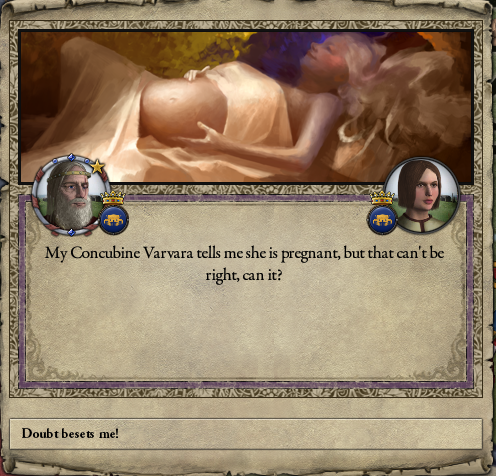 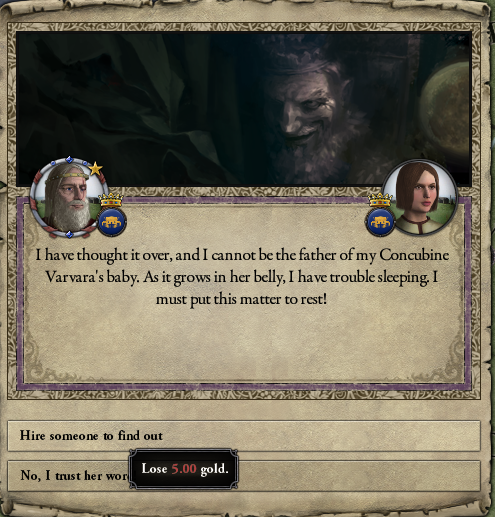  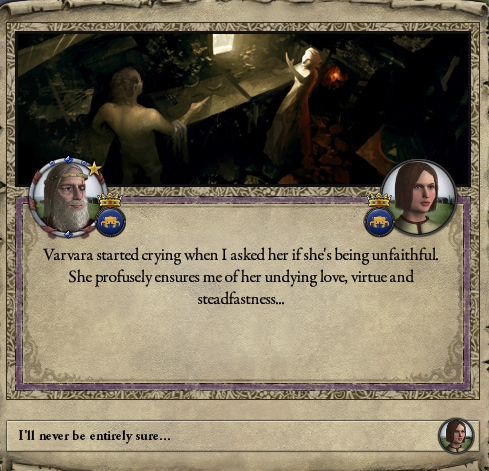 It appears that whole thing is going to happen again later that year, as Briachislav once again accuses one of his concubines of being unfaithful. Thankfully, the veche manages to collect enough taxes to fund another war, completely distracting Briachislav from his paranoia. This time Briachislav sets his sights on a brand new target: the Prussians of Zemaiteje.  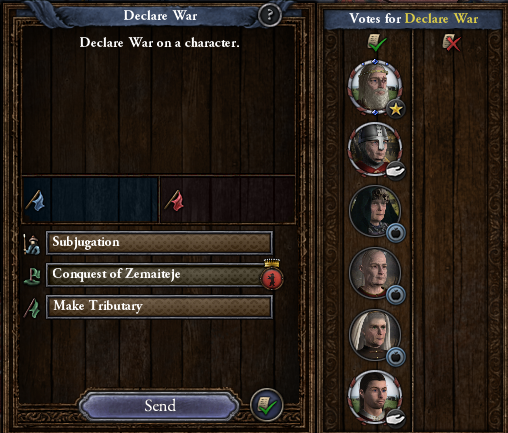 The veche also funnels some of the taxes they've collected into building a practice range in Novgorod, promising Briachislav that in the near future, the city's levies will finally field actual archers.  The Ilmenians and Prussians finally clash at Latgale, and the superiority of arms and training quickly wins the day for Briachislav. Meanwhile, in Novgorod the veche holds a quiet vote to raise the taxes collected from temples and churches in an attempt to find another source of funding for the chiefdom.   The Prussians next move to take Vilnius, but Briachislav out maneuvers them and manages to kill half their number, resulting in them disorderly fleeing the field, fleeing back towards the Prussian capital of Memel. Without anyone to oppose him, Briachislav lays siege to Zemaiteje, finally taking it in February 852.   Looking to put an end to the war, Briachislav moves to meet the Prussians at Memel. Not wanting to risk damaging their greatest city, the Prussians instead meet the Ilmenians at Scalovia. Once again, the Ilmenians swiftly defeat them and not too long afterwards peace is made in March of 852. Briachislav renames Zemaiteje to Jemotskaia Zemlia, though it is typically shortened to Zemlia.  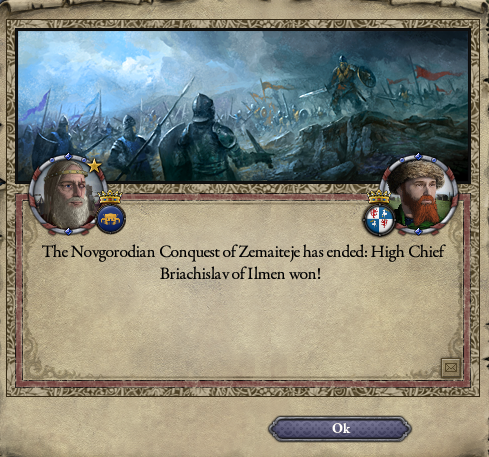 With the war over and the chiefdom once again in debt, Briachislav returns to studying languages, until he finally masters the basics of both Greek and Albani. His new found fluency comes just in time, as the heir to the Ashina khanate finally comes of age; the Khazars of Ashina also have extensive contact with the Byzantine Empire, mostly in the form of mercenary work during the Year of Four Emperors, and Baghatur speaks enough Greek that Verkhoslava can understand him. The marriage is a major boost to Ilmen's prestige and power, cementing the chiefdom's place as a rising regional power. 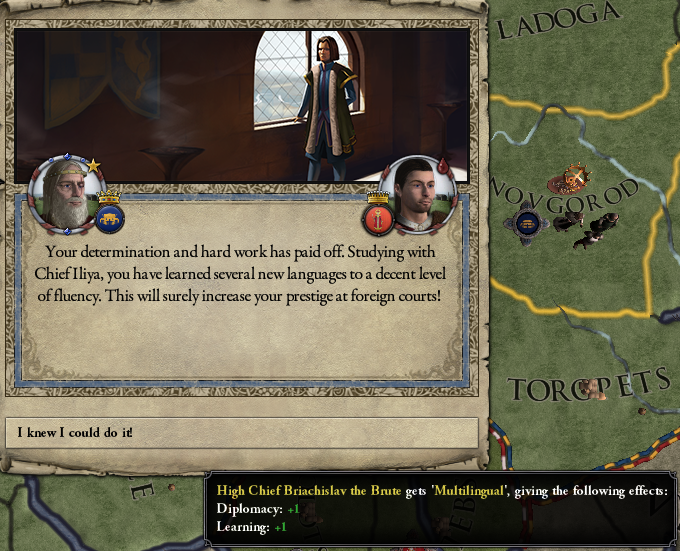  Briachislav turns this new clout into convincing the veche to support his move to name one of his relatives as chief of Zemlia, as well as getting the them to help expand Novgorod's practice range by collecting some extra taxes from the temples of Ilmen.   In August of 853, the chiefdom is back in the black, which means its time for one of Briachislav's wars; this time against the Prussians of Kurzeme. Briachislav persuades the veche to back him by promising new trade ships and ports in Kurzeme for several of the veche's most prominent trading families.   Unlike previous wars, the Prussians of Kurzeme show no fear or concern for Briachislav's reputation of ferocity and quickly take Zemlia; Briachislav decides to teach them a lesson about showing proper respect and he engages their army at Riga, killing the majority of the Prussians that join in the battle. 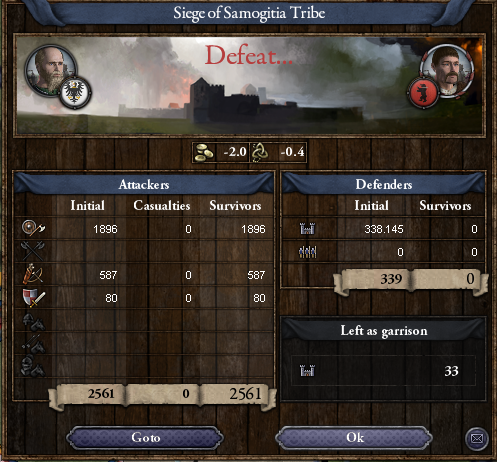  With the Prussians bested, Briachislav begins taking Prussian cities with little to no resistance; Kurzeme, Sambia, and Romowe fall to Briachislav's armies and soon the Prussians start looking for peace. In June of 854, Kurzeme is officially made part of Ilmen.     Briachislav also makes good on his promise to the veche; Kurzeme is handed off to one of the richer merchant families, as well as given an exemption from paying taxes for a period of five years in order to help the city build up its ports and fleet of merchant ships.  Briachislav and the veche also spend some time updating the laws created by Zbignev, with the idea of further codifying the powers of the high chief and the veches. After some months debate over which powers will be given to the high chief and which to the veches of Ilmen, the updates to Zbignev's laws are finally passed in December of 854.   Briachislav returns to studying languages and hunting in his spare time, but nearly a year later he passes away peacefully in his sleep, his final wars unwaged. His death is mourned by everyone in Novgorod and Ilmen and a week of mourning and sorrow is held in his honor. Every soul in the chiefdom knows that a great man has passed into the afterlife, where he will be eternally honored by Perun as one of his chosen.  History remembers Briachislav as High Chief Briachislav Bezumnyy, often translated as Briachislav the Unreasonable.
|
|
|
|
I really can't wait til we have one of those inexplicably long lived rulers. You know the ones, where them living so long throws all your neat succession plans straight to hell because they just. Won't. Die!
|
|
|
|
Chapter 15: The Old Chief When Rogvolod is already an old man when he inherits the chiefdom from his brother Briachislav. Unlike Briachislav, who's talents were more inclined for war, Rogvolod is more suited for rulership. He's also much more temperate and calm than his brother, but there are persistent rumors that he enjoys the company of other men in the ways a man would normally not.  Rogvolod's first act as high chief is to declare war against his nephew Fedot, the chief of Zemgale and Zaozerye; when Briachislav died, several of chiefs on the peripheral of Ilmen have declared themselves independent. Rogvolod is determined to return them to the fold, though the veche is divided on their support for such a war, as many of them are relatives of Fedot.  Rogvolod doesn't inspire as much confidence as his brother did and, as such, the men that are willing to fight for him are far fewer in number. Still, he is able to summon a fair host and, despite his advanced age, he chooses to lead them from the front. Rogvolod finally engages his nephew at Liivimaa and the two find themselves facing each other in personal combat; Rogvolod's age starts to show and he is gravely injured when Fedot badly slashes his face. Rogvolod attempts to flee, but falls off his horse, getting trampled in the process; this completely ruins his face. Still, the Ilmenian army became a finely tuned machine under Briachislav and even seeing their leader maimed, they do not break and instead win the day.    Riga and Zemgale fall to Rogvolod and soon Fedot is asking for peace. Rogvolod takes pity on his nephew and only takes Zaozerye from him, though the threat of the Ilmenian army coming back still hangs over Fedot's head.   Rogvolod's health begins to recover after the war against Fedot, but both he and the veche decide that the administration of Zaozerye would be best left to someone with more youth; the majority of the veche picks Chief Vladimir of Ladoga, a kinsman of Rogvolod, to give Zaozerye to.   In September of 856, the island of Saaremaa, long conquered by the Norse, manages to overthrow the foreign chief ruling them and elects an Estonian peasant to rule over them. Rogvolod and the veche see the strategic importance of Saaremaa and aren't too eager to leave it independent for long, lest the Norse return to conquer it, so they declare war on the peasant chiefdom.  The Ilmenians engage the Estonians at Kalevan and soundly defeat them. The Estonians cross back into Saaremaa, hoping that the Ilmenians won't have the ability to follow them over the water; they turn out to be wrong and the two armies fight outside of the city of Hiiumaa, where the Estonians are defeated for good. Saaremaa falls not too long after, bringing the island under the control of Ilmen.    Saaremaa is annexed in spring of 857 and the temple at the city of Hiiumaa is turned into a proper Slavic one, just as Riga was during Briachislav's reign, before the whole island is given over to Chief Volodar of Läänemaa.   Rogvolod is now old and injured and instead of war, he decides to take up reading and writing poetry; unfortunately he doesn't seem to have a talent for it, so instead he takes to falconry, which he finds much more enjoyable. 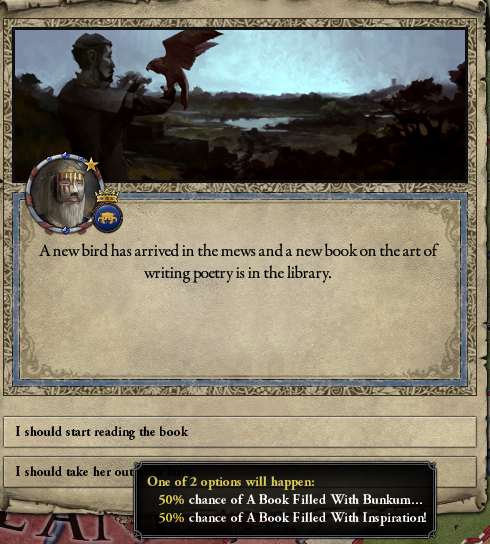  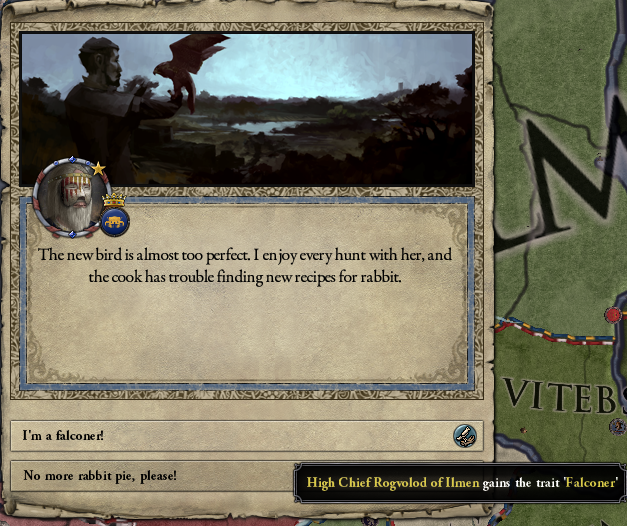 He also overseas the biggest expansion of Novgorod's harbor in the city's history, making it something to be envied by all Ilmen's neighbors.  The expansion of Novgorod's harbor would be Rogvolod's last act as high chief, as he passes away in April of 858 at the age of 61. While his reign was incredibly short, the three relatively peaceful years he did rule afforded the chiefdom a moment to catch its breath and recover following Briachislav's aggressive wars.  History remembers Rogvolod as High Chief Rogvolod Staryy, often translated as Rogvolod the Old.
|
|
|
|
Chapter 16: Reformation Ruslan is elected chief in the wake of Rovgolod's death and he takes the throne in May of 858. While he's neither as gifted as Rogvolod at administration or Briachislav in matters of war, he's still fairly decent at both, as well as quick to make friends and sway even his worst enemies to his point of view. His way with words, combined with his military prowess and better than average administration skill, allows the chiefdom to hold together in the wake of Rogvolod's death.   Ruslan prays to the ancestors, hoping that they will give him the ability to make friends easily, allowing him to keep the Ilmen from crumbling under the massive administration strain its currently facing; He chooses to send one of Briachislav's concubines to the afterlife.   He also dedicates himself to Jarilo, as most chiefs before him have; Ruslan has no intention of rocking the boat and angering the people who do most the day-to-day running of the realm.  Ruslan's prayers for companionship are answered in a strange way: a black cat begins to follow him around. Though he's relatively indifferent towards the concept of owning a pet, Ruslan's trusting and gregarious nature eventually wins out and he fully adopts the cat, naming her Dennitsa after the goddess of the morning star.  Ruslan continues to rule peacefully, intent on winning the hearts of his people; when a noble thankful for his advice gives him a small amount of gold as a gift, Ruslan immediately gives it to the poor. The people of Novgorod begin to speak of Ruslan's charity and gentle nature.  Ruslan's diplomatic nature pays off when, at the start of the new year, he proposes a new law that would allow him to strip titles from heathens who refuse to recognize the Slavic gods. While he has no intention of actually using the law (the Orthodox chiefs of Estonia have become entrenched and rich due to their access to the Baltic), he does plan to use it as a method for negotiating the loyalty of the Estonian chiefs.   As spring finally dawns in April, Ruslan continues the work started by Rogvolod and declares war on Fedot of Zemgale with the intention of regaining the city for Ilmen. The veche initially pushes back against Ruslan, as many of their number include Fedot's kinsmen, but after some honeyed words and gold, they decide their familial loyalty to Fedot aren't as strong as their ties to Ruslan.  Zemgale itself falls without much response from Fedot and Ruslan prepares to take Riga when a messenger from the chiefdom of Poland arrives, with a massive entourage.  The message, needless to say, is rather shocking to Ruslan.  The man, through one of his two Greek translators, explains that he is High Priest Karol, the head of the Reformed Slavic Church. King Prendota has conquered the Bohemians and, with the aid of two Greek brothers, he has codified the religion of the Slavs and created an official language for this new Slavic church. He also explains that while all the Slavic gods are honored, King Prendota has proclaimed that Perun is to be honored above all the others, which slightly conflicts with the Ilmenian strain of the religion. Karol then demands to know if the Ruslan and the Ilmenians will adopt this new Slavic faith, or if they will deny progress and the will of King Prendota.   If what Karol claims is true, then Poland has become the undisputed power of the Slavic world and it wouldn't do to carelessly ignore his claims as the rantings of a madman.  The war against Fedot is put on hold and Ruslan rushes back to Novgorod, where he convenes an emergency session of the veche, to discuss these developments. Ruslan has asked the veche for their guidance, but there are many voices and opinions. Which one held the day though? Please pick only one! Option A: The Sons of Perun The veche advised that Ruslan accept Prendota's reformed Slavic faith, which blends the old ways with newer influences, taken from the religion of the Greeks. The only points of contention is the placement of Perun over all the other gods and goddesses, as the Ilmenian people have always honored Jarilo above all, as well as the fact that the High Priest of the faith is effectively a Polish puppet. (Effect: Ilmen will adopt the Reformed Slavic faith, which will have a strong Polish influence. While its possible that Ilmen can eventually take control of the church from the Polish, if the Polish remain in control of the church by the time we hit EU4, then there might be some... difficulties.) Option B: Greek Gifts The Greeks of Estonia have greatly influenced the Ilmenians there, enough so that they have a significant voice in the Novgorod veche. The veche also had no interest in allowing the Polish king to influence Ilmenian affairs; the Orthodox faith promises the least amount of outside influence, as the Greeks are incredibly distant and the patriarch of Constantinople holds little sway outside of the Byzantine Empire. (Effect: Ilmen will convert to the Orthodox faith, completely cutting ties with the Slavic world. The Orthodox faith is also the religion of the Byzantine Empire and, if they can ever get their poo poo together, could provide a useful and powerful ally. That's an extremely big if, though, and they most likely won't be viable for a number of years.) Option C: The Latin Faith The Albani priests brought back by Rodislav II following his voyage to the distant island have been slowly converting Ilmenian peasants to their strain of Christianity and in recent years they have been able to convert the chief of Torzhok, giving them a small, but vocal voice in the veche. The veche refused to choose between the Polish king and the Greek emperor and instead decided to throw their lot in with the Franks and the Pope of Rome. (Effect: The Pope and Francia are distant enough that accepting Catholicism would mean Ilmen would only have to pay lip service to the faith, though it might be a useful tool should we wish to join up with Francia and crush Poland in between us. This option also has similar problems to the Orthodox one, as it won't be something we can realistically do for a number of years, during which Poland might become so strong that not even Francia can stop them.) Option D: Islam is the Light! The traders of Novgorod have had a small amount of contact with the Muslims of the Middle East, though such contact has grown in recent years thanks to the Subaid Emirate in Anatolia and, even though it has recently been reconquered by the Byzantines, their influence lives on in some of the merchants that regularly traded with them: several of them have accepted the faith and are using their wealth to persuade others to join them. (Effect: Ilem will become Sunni Muslims. Unlike the first three options, there is no strong Islamic ally nearby who would realistically help Ilmen should the need arise and pretty much everyone would hate us. Oh also, I'd probably throw in some province modifiers to simulate rebellion against the outlawing of alcohol; according to Russian legend, the banning of alcohol is a major reason why Islam was never accepted by the various Russian rulers, so I figure increased revolt rate for a few years would simulate this phenomenon pretty well. The upside is that Ilmen would have the most control over their strain of Islam, as the caliph and other Muslims are extremely distant.) Option E: Next Year in Israel The Jewish people have always had a way to the strangest of places and with Ilmen's limited contact of with the Muslim world, a few have found their way to Novgorod. While still an extreme minority, the Jews of Novgorod still have a small voice in the veche. It is completely possible that none of the other choices would satisfy the assembled members of the veche and that they would instead land upon picking Judaism as the official faith of the chiefdom. (Effect: To be honest, this choice will not have a whole lot of effect, besides making Ruslan Jewish. Ruslan doesn't have the the diplomacy to convert his vassals and Judaism's moral authority is so low that no provinces will convert. Vote for this if you don't want to vote on any of the other choices and want a civil war to decide which faith we go with. To be absolutely clear, this is the option you pick if you want to leave our religion up to complete random chance!) While the future faith of the chiefdom was the main reason for the veche to be assembled, talks naturally turned towards the future administration of the chiefdom. While nothing was set in stone, these discussions would shape the future of Ilmen. Please only pick one! Option 1: Vox Populi The veche of Novgorod has slowly grown in power, usually at the expense of the high chief, but not always. The prevailing sentiment is this shouldn't be the case: the veche and the high chief should work closer together, with the high chief being elected by the veche from its ranks. Naturally, the Slovensky family has many members in the veche, so its likely that several of these elected high chiefs would be from their number, but its no guarantee that every single elected chief will be from their family. This option is also heavily favored by the merchants of Novgorod. (Effect: I'll be angling for the merchant republic government, though I won't adopt it immediately, since doing so would be suicide, considering all the pagans we'll be surrounded by. When I do adopt it, I'll make sure to pick every single council decision to empower the council and I'll never go against the council's wishes until they've been suitably bribed or coerced. I'll also never allow myself to be elected ruler twice in a row, unless its completely unavoidable.) Option 2: Help, Help! I'm Being Oppressed! The veche of Novgorod has slowly grown in power, usually at the expense of the high chief, inevitably leading to a power struggle between the two. At the best of times, this leads to a weak puppet chief, while at the worst it leads to constant wars and reprisals. The veche has decided that this cannot be allowed, even if it means a curtailing of their own power and the empowering of the high chief as king, styled after Prendota. (Effect: I'll be working my way towards going fully feudal monarchy. This means that I won't necessarily empower the council, though its possible with the right high chief, and that I won't always follow what they want. I'll also be angling to pick up primogeniture for my succession law.) When you vote, please record it as a letter followed by a number! For example, if you want to go with Reformed Slavic and a feudal monarchy, please write A2! It'll be easier for me to count that way! Finally, the vote will last for a total of three days, ending on Saturday, probably around noon my time.
|
|
|
|
Just as a note, I did not do anything to encourage the AI to reform the Slavic faith and I was completely surprised when it happened; the AI absolutely did this whole thing by themselves and because of this, I've had to stop playing the game for about three weeks while I caught up on updates. To that end, I've sort of been rushing these updates so that I could hold this vote and actually play the game, so don't expect updates following the vote, as I'll have to rebuild my backlog of screenshots.
|
|
|
|
A 2
|
|
|
|
B1. Orthodoxy has been becoming more and more entrenched in the Veche and the realm in general, and I have no interest in us bowing to a Polish puppet! Also, Merchant republics are fun.
|
|
|
|
A1
|
|
|
|
E1
|
|
|
|
B1
|
|
|
|
B2 We need a strong leader, and I find the Brutus Salad fucked around with this message at 18:03 on Nov 22, 2017 |
|
|
|

|
| # ? Apr 28, 2024 15:47 |
|
Call me a big sheet of paper, because I'm A 2
|
|
|


